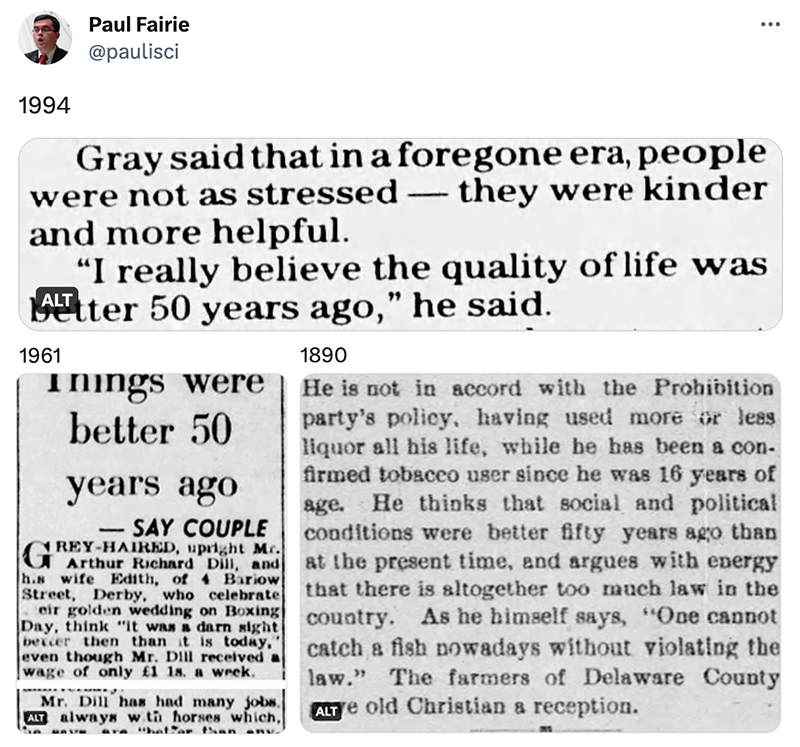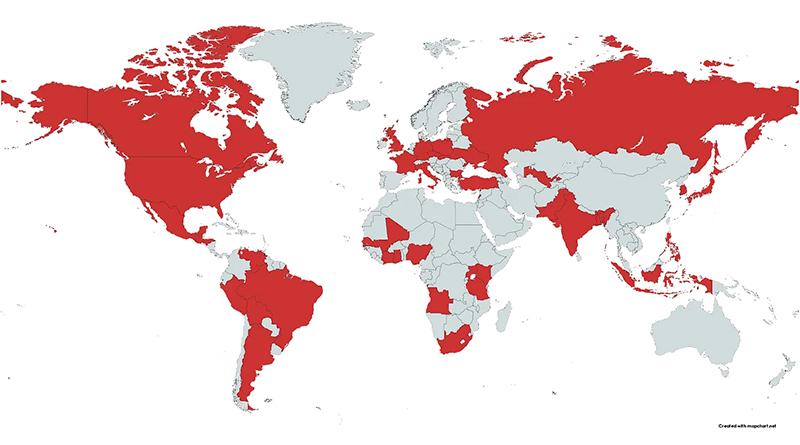Volcanoes are erupting in The Philippines, but on-fire Australia received some welcome rain. The Iran war cries have been called off and The Donald’s military powers are about to be hamstrung by the Senate. Meanwhile, his impeachment trial is starting, and we’re all on Twitter for a front-row seat.
What Could Go Right? Moral breakdown!
Isn't real. We tend to view the past through rose-colored glasses, but humans are not demonstrably worse than they used to be.
This is our weekly newsletter, What Could Go Right? Sign up here to receive it in your inbox every Thursday at 6am ET. You can read past issues here.
Moral breakdown isn’t real
Make America Great Again. Without going into an exegesis of why that slogan appealed to which groups of people, one basic reason why it was successful was because all humans tend to look at the past through rose-colored glasses.
In 2023, six of every ten Americans in one poll said that “life for people like them is worse today than it was 50 years ago.” You can paint all sorts of modern political takes onto that result. At least until you see that Americans have been saying a version of that statement consistently since 1890.

University of Calgary instructor Paul Fairie’s playful Twitter thread, “A Brief History of Things Were Better 50 Years Ago,” has many more examples.
Romanticizing the past is not just an American thing. Neither is it a liberals versus conservatives nor a young versus old people thing, as some might imagine. A new paper from Adam M. Mastroianni and Daniel T. Gilbert on the illusion of moral decline collected 177 United States–based and 58 international surveys to see whether majorities think that people, on the whole, are getting nastier, less trustworthy, more disrespectful and dishonest, and so on.
It turns out that the “moral decline” mentality is popular. Two Pew Research surveys from 2002 and 2006, which Mastroianni calls the “best data” of the available surveys, asked people in the red countries below whether moral decline is a problem in their country. Of the countries asked, in every single one, a majority of people said that it was a “moderately big” problem.

“Things used to be better” and “people used to be better” aren’t the same sentiment, but they’re in the same neighborhood. We have sent out a lot of newsletter editions discussing the former.
As for the latter, after measuring whether people think moral decline is an issue (they do), Mastroianni and Gilbert then set out to see whether morality is actually declining, again doing a comprehensive look at a bunch of surveys to see whether there has been a change, over time, of people reporting more disrespect and unkindness and less help and cooperation, and so on in their everyday lives. There hasn’t. Answers about the presence of basic moral behavior have remained at steady levels for years.
Of course, that doesn’t prove that we are more moral than before—although there is evidence for that—or even that we meet whatever your own personal standards of morality might be. But it does show that there is no big “decline in morality” disaster that we need to be brought back from the brink of. There is a lot more in both the paper itself, which is open access, and Mastroianni’s more readable summary of it, including why we’re susceptible to this view.
Make America Great Again was a good (great?) example of nostalgia-based politics being used in the wild, but nostalgia politics isn’t the providence of any one politician or group. It’s a popular tactic that we would be wise to recognize before it plays on our fears. As Mastroianni writes:
If you think that morality is declining, then you must think that some switch has been flipped in society, causing it to produce worse humans. No doubt you would want to un-flip that switch, whatever you think it is: smash the social media companies! Kill all the politicians! Ban the bad books! None of that is going to reverse the trend, because the trend doesn’t exist. It’s like activating the sprinkler system in a building that’s not on fire.
So before we run off and support any such flip un-switchers, know this: there is no fire! Humans are not demonstrably worse now than at any time during the past.
Quick hits
In support of the above, volunteering rates in the US have gone unchanged for decades, except for a pandemic-related dip during 2021. Even so, in 2021, half of Americans informally helped out neighbors, and a quarter formally volunteered. Utah, Wyoming, Montana, and Nebraska deserve shout-outs for leading rates of volunteerism and neighborly help, respectively.
We have reached the season four finale of our podcast! We talk everything from Italian politics to how humanity has avoided mass starvation despite booming population numbers. Listen here, and we’ll be back with a new season in the fall.
Below in the links section, new hope for Galápagos birds, a gel for getting it up, AI for water pollution and wildfires, and more.

A Look Back and a Look Forward | S4 E19

Is the US economy okay or even positive? Are we making any progress on climate change? What’s going on with global inequality? As we close out this season of “What Could Go Right?” hosts Zachary Karabell and Emma Varvaloucas look back at the predictions that started the year and check in with the current news of the day. | Listen to the episode
Progress, Please
(Found good news? Tweet at us @progressntwrk or email.)
Other good stuff in the news 🐦
Energy & Environment:
- Peak oil demand “on the horizon” | Axios
- The surprising truth about which homes have heat pumps | MIT Technology Review
- Rooftop Solar Grew Nearly 50 Percent Globally Last Year | E360
- Reviving the Lost Waterways of India’s ‘City of Lakes’ | Reasons to Be Cheerful
- ‘New hope’: Tiny Galápagos island birds make promising comeback | Euronews
- World’s Largest Operating Offshore Wind Farm Stands Complete | Offshore Wind
Public Health:
- Super-engineered vaccines created to help end polio | BBC
- There’s Now an Over-the-Counter Gel for Erectile Dysfunction | Gizmodo
- More than a Million Moroccans Connected to Clean Water | The World Bank
- How Nutrition Education for Doctors Is Evolving | Time
- 90% of patients respond to new blood cancer treatment in trial | Freethink
Science & Tech:
- Synthetic human embryos created in groundbreaking advance | The Guardian
- Genome editing used to create disease-resistant rice | Phys.org
- AI to stop water pollution before it happens | BBC
- AI is riding to the rescue on wildfires | Freethink
- Tiny robot could stop bleeding from inside the body using heat | New Scientist
Politics & Policy:
- Turkmenistan moves towards plugging massive methane leaks | The Guardian
- Germany says climate measures will narrow emissions gap by 2030 | The Hill
- Japan redefines rape and raises age of consent in landmark move | BBC
- Japan ruling on same-sex marriage disappoints but ‘a step forward’ | Reuters
- Iceland bans so-called ‘conversion therapy’ in unanimous vote | Attitude
- Supreme Court Upholds Native American Adoption Law | The New York Times
- Switzerland referendum: Voters back carbon cuts as glaciers melt | BBC
Society & Culture:
- Estonia legalizes same-sex marriage | Politico
- Women of every race and ethnicity broke representation records in statehouses after the 2022 midterms | The 19th
- Student activists helped pass Washington’s new assault weapons ban | Crosscut
- Nusrat Chowdhury confirmed as first Muslim female federal judge in US history | AP
- Juneteenth grows as a state holiday and paid day off | Axios
Economy:
- Australia’s unemployment falls to 3.6% as the economy adds 76,000 jobs in May | The Guardian
- UPS workers win a deal to get air conditioning in new trucks | NPR
- American Millennials and GenZers feel wealthier than Boomers | Quartz
- Inexpensive Solar Panels Are Essential for the Energy Transition. Here’s What’s Happening With Prices Right Now | Inside Climate News
- The mid-career workers pivoting to dream jobs | BBC
TPN Member originals 🧠
(Who are our Members? Get to know them.)
- Brace yourself: The AI jobs panic is about to explode | James Pethokoukis
- My chat with machine-learning scientist (and AI optimist) Bojan Tunguz of Nvidia | James Pethokoukis
- The Path to Happiness Is Narrow but Easy | Arthur C. Brooks
- The next global superpower isn’t who you think | Ian Bremmer
- Is inflation finally going away? | Isaac Saul
- I Won’t Let Donald Trump Invade My Brain | David Brooks
- The Story We’ve Been Told About Juneteenth Is Wrong | Peniel Joseph
- Here’s the right way to celebrate America at 250 | Theodore R. Johnson
- Why fatherhood and marriage don’t have to go together | Richard V. Reeves
- Amna Khalid and Jeff Snyder on Fighting Illiberalism, Right and Left | Yascha Mounk
- Developing a technology with safety in mind | Jason Crawford
Department of Ideas 💡
(A staff recommendation guaranteed to give your brain some food for thought.)
When Doctors Use a Chatbot to Improve Their Bedside Manner | The New York Times
Despite the drawbacks of turning to artificial intelligence in medicine, some physicians find that ChatGPT improves their ability to communicate empathetically with patients.
Why we picked it: Unexpected use cases for AI keep popping up, and this one is especially interesting. AI teaching humans to be more—ahem—human conjures well-worn dystopian scripts, but maybe it’s not a bad thing that technology we created is helping us to be better versions of ourselves. —Emma Varvaloucas
Until Next Time
Pour one out for fun and the 666 bus to Hel. 🙁


